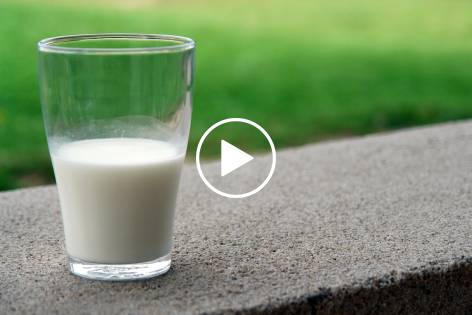
LMU 152 – Milk Matters: The Telomere Tale
Source: Oxidative Medicine and Cellular Longevity (2019)
Lifestyle Medicine Update (Feb 14, 2020)
Introduction:
For years, the debate over the virtues and vices of milk and dairy products has raged on. Is the creamy delight a source of nourishment or a harbinger of health woes? While the saturated fat in dairy has long been associated with increased cholesterol levels and a higher risk of heart disease, a startling revelation emerged in 2019. This revelation reached far beyond the confines of cholesterol concerns, offering a glimpse into the very fabric of human aging. A study of 5,834 adults dared to probe deeper into the effects of milk consumption on the body’s aging process. The findings turned conventional wisdom on its head, suggesting that our choice of milk may hold the key to how fast we age.
The Telomeres: Biological Clock keepers
At the heart of this study lay an intriguing marker of cellular aging: telomeres. These tiny structures, akin to shoelace tips, cap the ends of our DNA strands. Telomeres, like biological clock keepers, are known to hold sway over the aging process. With each cell replication, telomeres gradually shorten, offering a window into our cellular age. The shorter our telomeres, the more pronounced the signs of aging become, and the greater the risk that cells will veer down the path of cancerous transformation. The study embarked on a journey to unravel the relationship between telomere length and milk consumption patterns, shedding light on a hitherto uncharted realm.
Sip by Sip: Milk and Telomeres
The study’s gaze extended to participants’ milk-drinking habits, exploring the frequency of milk consumption (daily drinkers versus those who indulged weekly or less) and the fat content of milk imbibed (whole, 2%, 1%, or skim). The revelations that followed were nothing short of astonishing. A clear correlation emerged: the more high-fat milk one consumed, the shorter their telomeres. For every 1% increase in milk fat intake (choosing 2% over 1% milk), telomeres dwindled by sixty-nine base pairs. This innocuous difference translated into over four years of accelerated biological aging. The extremes of milk consumption were even more striking: those who savored whole milk sported telomeres a staggering 145 base pairs shorter than their non-fat milk counterparts. This equated to an additional eight years of biological aging. These findings resonated deeply with the current Dietary Guidelines for Americans (2015-2020), which advocate for low-fat milk—both non-fat and 1% milk—as part of a healthy diet.
The Milk Matrix: Separating Fact from Fiction
These revelations beckon us to reevaluate our milk choices. Low and non-fat milk emerges as heroes on the dairy stage, not only for their favorable impact on telomere length but also for their role as calcium-rich, high-quality protein sources. Delving deeper into dairy territory, 1% or non-fat (0%) Greek yogurt emerges as a star performer. It boasts even higher protein content, lower lactose levels, and the bonus of probiotics—a trifecta that fosters gut health and balances the body’s microflora. For individuals plagued by milk allergies, plant-based alternatives step into the spotlight, offering a diverse array of choices to cater to varying dietary needs and preferences.
Conclusion: The Milk of Time
The study’s findings transcend the realm of dietary recommendations and cholesterol concerns. They tap into the very essence of aging, offering a tantalizing glimpse into the biological clock that governs us all. Telomeres, those humble genetic bookends, stand as sentinels of our cellular age. The choice between high-fat and low-fat milk, it seems, can tip the scales of this biological balance, shaping the pace at which we age. As we savor each drop of milk, we may also be savoring the moments of our lives, inching closer to—or farther from—the hands of time.
References:
Larry A. Tucker. Milk Fat Intake and Telomere Length in U.S. Women and Men: The Role of the Milk Fat Fraction. Oxidative Medicine and Cellular Longevity, 2019. [Read the full study here](https://www.hindawi.com/journals/omcl/2019/1574021/).
Eat Smart, Live Well, Look Great
Dr. Meschino

Dr. James Meschino
ABOUT THE AUTHOR
Dr. James Meschino, DC, MS, ROHP, is an educator, author, and researcher having lectured to thousands of healthcare professionals across North America. He holds a Master’s Degree in Science with specialties in human nutrition and biology and is recognized as an expert in the field of nutrition, anti-aging, fitness, and wellness as well as the author of numerous books.


